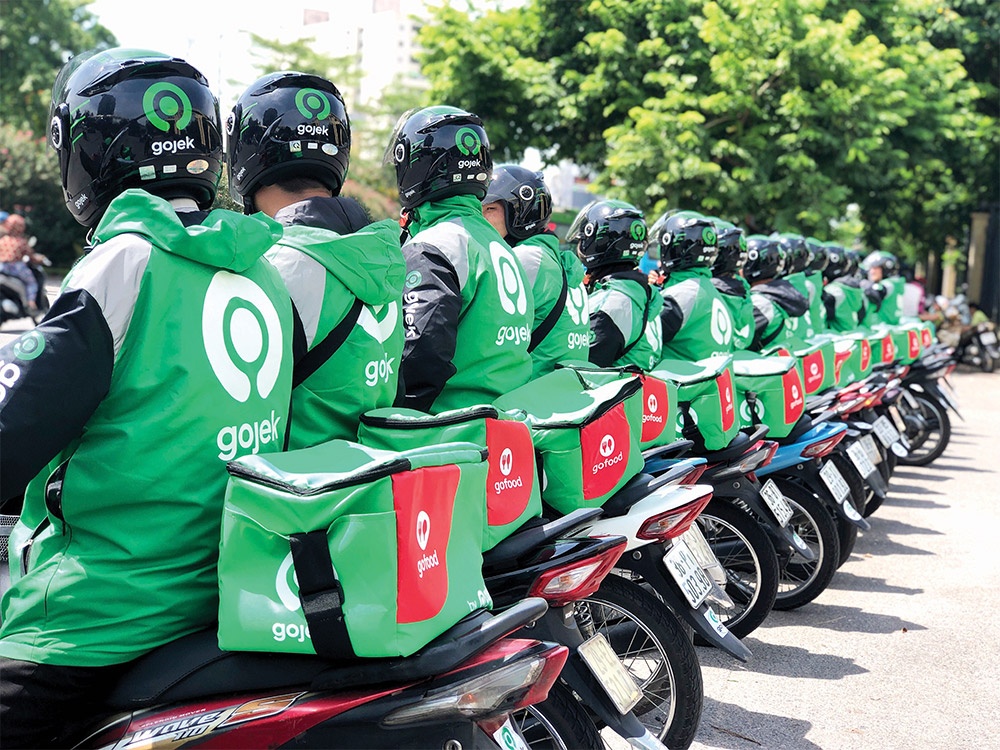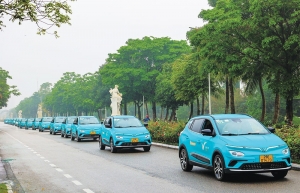Gojek exit leaves door open for ride-hailers to ascend
 |
| Gojek exit leaves door open for ride-hailers to ascend |
Last week, Indonesian-backed Gojek, a ride-hailing and food delivery platform, revealed it would cease operations in Vietnam as of September 16, marking the end of its six-year presence in the country. According to a company representative, the decision is part of the long-term strategy of its parent company, GoTo Group, allowing it to focus on activities with more sustainable market impact.
“We are grateful to our employees, users, driver-partners, and restaurant partners, all of whom have been integral to our business in Vietnam. Necessary support will be provided to all affected parties during this transition, in compliance with local regulations,” the representative said.
The announcement surprised many, given Gojek’s recent optimism about the Vietnamese market. In an interview with VIR just over a month ago, Sumit Rathor, general manager of Gojek Vietnam, emphasised the country’s potential, driven by rapid urbanisation and a tech-savvy population.
Rathor noted that the ride-hailing market in Vietnam was expected to grow significantly, with projected revenues of $1.73 billion this year. Vietnam’s digital economy and sharing economy continue to hold great potential, especially in cities like Hanoi and Ho Chi Minh City. However, macroeconomic challenges such as tightening consumer spending and increasing price sensitivity have posed difficulties for tech-based businesses like Gojek.
In the first half of 2024, Gojek introduced over 10 new product features in Vietnam, aimed at enhancing the user experience and expanding its market appeal. After partnering with electric vehicle startups in 2023 to pilot the use of electric motorbikes in ride-hailing services, early this year, Gojek also partnered in a programme to support drivers in Ho Chi Minh City to buy electric vehicles through a special instalment loan with a zero interest rate.
The company also focused on long-term promotional programmes to keep services affordable, but these efforts were insufficient to sustain Gojek’s presence amid fierce competition.
Despite its challenges, Gojek served millions of users across transport, food delivery, and logistics. Rathor emphasised the company’s commitment to innovating and adapting to the changing needs of users. However, just months later, Gojek’s departure follows other high-profile exits, including Uber six years ago and Baemin’s decision to cease operations nine months prior.
Gojek was founded in 2010, initially focusing on parcel delivery and ride-hailing services before launching its app in 2015 in Indonesia. Gojek then expanded its operations to Vietnam in 2018 under the name GoViet. Just two months later, it launched its online food delivery service, GoFood.
In 2020, the GoViet brand was phased out, and the firm was renamed Gojek Vietnam. It operated in Ho Chi Minh City, Hanoi, and the southern provinces of Binh Duong, and Dong Nai before halting its operations.
Seeking to take over
Tran Anh Tuan, deputy director of the Institute of Applied Research and Innovation for Entrepreneurs, said competition is fierce in the ride-hailing market.
“Similar to e-commerce, players from corporations to startups have jumped on the wagon. While the market demand is limited, the market share is shrinking and is no longer as attractive as before. Therefore, it is normal for Gojek to withdraw from the Vietnamese market,” Tuan said.
“Besides competing on pricing, its rivalries boast superapp platforms featuring a wide range of services for customers. Gojek’s withdrawal does not change the nature of this market, as competitors are waiting to replace its position.”
The exit of foreign players presents a window of opportunity for domestic and other international competitors to strengthen their foothold in Vietnam’s ride-hailing sector.
A representative from Be Group, one of the key players remaining in the market, said, “Foreign companies often enter Vietnam to tap into new markets and maximise profits. However, fierce competition and market challenges have forced them out, leaving domestic companies to step in.”
Industry experts predict that Gojek’s withdrawal will trigger disruptions in market rankings and provide an opportunity for the remaining players to consolidate their positions. According to Ralf Matthaes, managing director of IFM Research, tech platforms need to prioritise gaining market share over immediate profitability.
“Grab and other local players are currently leading, and with fewer competitors, we could see fare prices increase and service quality potentially decline as competition weakens,” Matthaes said.
He also speculated that mergers among remaining competitors may occur as they fight for market share, while others may face the same fate as Gojek, depending on their financial resources.
The Vietnam ride-hailing market is projected to reach $880 million in 2024 before growing to $2.16 billion by 2029, with an annual growth rate of 19.5 per cent, according to Mordor Intelligence.
According to a 2024 report by Q&Me, 42 per cent of Vietnamese people prefer Grab for motorbike-hailing services, followed by Be at 32 per cent, and Xanh SM at 19 per cent. Gojek, despite its previous popularity, saw only 7 per cent of users indicating frequent use in recent years.
Ahead of the curve
It is estimated that Grab Vietnam currently holds around 60 per cent of the ride-hailing market share. Grab’s arrival in Vietnam in 2014 marked the first of many appearances of what is termed ride-hailing services. Today, Grab says that more than a quarter of the Vietnamese population have used its services, along with 190,000 individual driver contractors.
Grab was also ahead of the competition in various aspects. In Southeast Asia, the majority of the population has used cash as payment, something which Grab allowed its users to do since its inception. This contrasts with Uber, which required users to pay via card, consequently deterring more from using their services.
With Gojek’s exit, domestic players like Be and Xanh SM are poised to seize the opportunity. The representative from Be Group highlighted the company’s long-term commitment to the Vietnamese market.
“After over five years, Be has solidified its position as a super app platform, offering 15 services and serving 10 million customers. We have a network of 400,000 ride-hailing driver partners and 80,000 merchant partners, with monthly order growth averaging 15-20 per cent,” he said.
Xanh SM, Vietnam’s first fully electric ride-hailing platform, has also made significant strides since its launch in 2023. The platform has served over 50 million customers and expanded operations to nearly 40 cities and provinces.
Nguyen Van Thanh, CEO of Green and Smart Mobility, emphasised the long-term potential of Vietnam’s transportation market, which was valued at $1.4 billion in 2023 and is expected to grow annually by 14-21 per cent.
Thanh also revealed Xanh SM’s ambitious plans to expand internationally, with the company aiming to enter seven foreign markets within the next two years. Xanh SM recently launched in Laos and plans to enter Indonesia by the end of 2024.
Xanh SM has also been aggressively expanding its market foothold through its strong partnership growth. The company has partnered with several taxi firms across Vietnam, including Lado Taxi, Son Nam, Thanh Ha Transport, ASV Airport Taxi, En Vang, and Taxi Xanh Sapa.
Meanwhile, other players are pursuing mergers, strategic partnerships, and new product launches to stay competitive. In 2023, Grab Holdings announced its acquisition of Trans-cab Holdings, further consolidating its position in the Vietnamese market.
“The outlook for Vietnamese tech companies like ours will be brighter. However, the competition will be more intense, and the last ones standing are the strongest,” the representative of Be stated.
 | Gojek inks partnership with Dat Bike in Vietnam Gojek – an on-demand, multiservice mobile platform – and Dat Bike – one of the fastest growing electric vehicle startups in Southeast Asia – announced on May 18 that they will partner to pilot the use of electric motorbikes in Gojek's transportation, logistics, and food delivery network in Vietnam. |
 | Gojek features GoFood on-demand delivery offering on MoMo On July 31, Gojek announced that its on-demand food delivery feature, GoFood, is now available on the MoMo platform, a partnership that continues to leverage the extensive and comprehensive synergies between the two brands. |
 | GSM expands e-taxi service with motorbike deployment VinFast has launched an e-bike ride-hailing service, hot on the heels of Gojek and Grab also setting up similar offerings. |
 | Gojek partners with Selex Motors to expand e-bike scheme Gojek has announced a partnership with Selex Motors, a pioneering Vietnamese electric vehicle (EV) startup, to pilot the use of Selex's Camel e-bikes across Gojek’s transport, food-delivery, and logistics services in Vietnam. |
 | Ride-hailing company Gojek to exit Vietnam Gojek, the on-demand, multiservice mobile platform, will close its Vietnam business effective September 16, according to an announcement made by its parent company GoTo Group on September 4. |
What the stars mean:
★ Poor ★ ★ Promising ★★★ Good ★★★★ Very good ★★★★★ Exceptional
 Tag:
Tag:
Related Contents
Latest News
More News
- Vietnam sets ambitious dairy growth targets (February 24, 2026 | 18:00)
- Masan Consumer names new deputy CEO to drive foods and beverages growth (February 23, 2026 | 20:52)
- Myriad risks ahead, but ones Vietnam can confront (February 20, 2026 | 15:02)
- Vietnam making the leap into AI and semiconductors (February 20, 2026 | 09:37)
- Funding must be activated for semiconductor success (February 20, 2026 | 09:20)
- Resilience as new benchmark for smarter infrastructure (February 19, 2026 | 20:35)
- A golden time to shine within ASEAN (February 19, 2026 | 20:22)
- Vietnam’s pivotal year for advancing sustainability (February 19, 2026 | 08:44)
- Strengthening the core role of industry and trade (February 19, 2026 | 08:35)
- Future orientations for healthcare improvements (February 19, 2026 | 08:29)





















 Mobile Version
Mobile Version